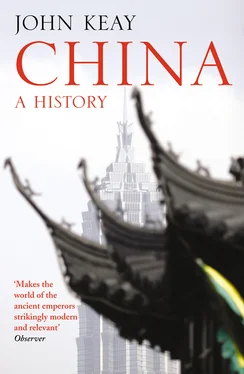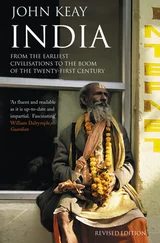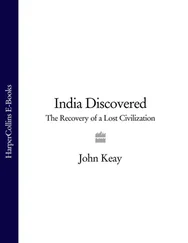Ironically the Zhou themselves, in justifying their initial success, provided a rationale for their eventual downfall. Their origins are disputed, but by the twelfth century BC they had established a jurisdiction in the valley of the Wei, a Yellow River tributary whose corridor of cultivation and passage (the main east–west railway nows runs alongside the Wei) fingers into the hills and deserts of Shaanxi province. It had once been, and may still have been, the western marches of the Shang domain, and it exposed the Zhou to frequent contact with a possibly proto-Tibetan frontier people called the Chiang. Zhou chiefs married Chiang brides, and it was with Chiang support that a Zhou leader, assuming the title of King Wen, challenged the Shang. On a third sortie down the Yellow River valley to the east, Wen’s son and successor, King Wu, engaged the Shang host at a place called Muye. The date, by the latest calculation, was 1045 BC. The Zhou triumphed while the Shang were routed and their king committed suicide. After suppressing further resistance, King Wu of Zhou returned to his Wei valley home (near Xi’an, today another of those cities of 6 million souls) and died there within two years of his victory.
Later commentators, looking back with the benefit of hindsight – not to mention sideways for contemporary approval – had a ready explanation for this success: the Zhou had won Heaven’s approval by their outstanding virtue while the Shang had forfeited it by their extreme degeneracy. Drunkenness, incest, cannibalism, pornographic songs and sadistic punishments enliven the catalogue of liturgical improprieties and governmental omissions later imputed to the last Shang king. Since the virtue that had once led to Shang’s elevation had deserted it, so had its right to rule. Dynasties, like the seasons and the planets, conformed to a cyclical pattern. They ascended and declined at Heaven’s cosmic behest. The Shang were doomed because Heaven had transferred its earthly ‘mandate’ to a worthier and more virtuous lineage. Defeat at Muye was therefore inevitable; indeed, the battle should have been a walkover.
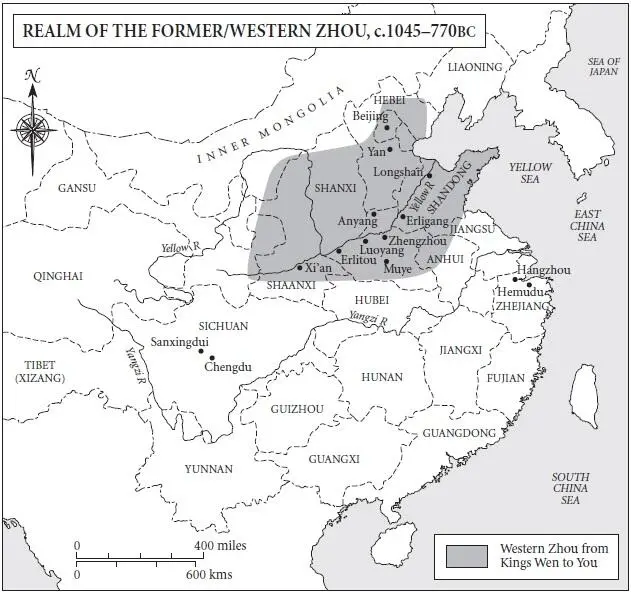
This concept of ‘Heaven’s Mandate’ or ‘Heaven’s Command’ ( tian ming ) may, though, have been news to the Shang. As revealed in the oracle bones, Shang’s supreme deity had been the stern and awesome Di ; ‘Heaven’ as an impersonal and infallible authority receives scarcely a mention in the bone inscriptions. It seems, then, to have been the Zhou who, while for a time retaining Di , introduced this new ‘embryonic philosophy of history’ which would become so fundamental to the legitimacy of every subsequent dynasty that it has been called ‘the cornerstone of the Chinese Empire’. 3As expounded by the Duke of Zhou, a younger brother of the deceased King Wu, power on earth derived from a supreme and impersonal entity called ‘Heaven’; and it came in the form of a devolved ‘mandate’ whose term was finite and in some way contingent on the virtuous conduct of the holder.
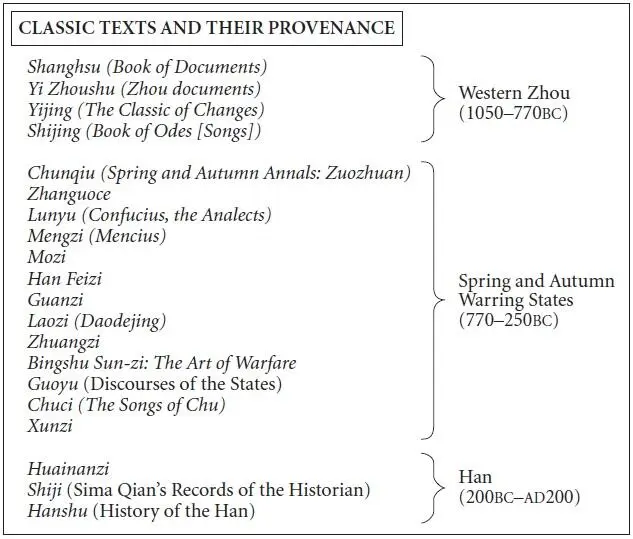
The phrase itself – ‘Heaven’s Mandate’ – first surfaces in a debate reported in the Shangshu that took place after King Wu’s untimely death in c . 1043 BC. Wu’s eldest son, the future King Cheng, was deemed too young or inexperienced to assume the reins of power immediately. A regency council was therefore preferred, and the Duke of Zhou, a consummate leader as well as the brother of the deceased Wu, duly assumed its direction with the support of a half-brother and the young king. But this triumviral arrangement was resented by several other royal brothers, who made common cause with a disgruntled scion of the defeated Shang and withheld recognition. The Zhou, poised on the threshold of power and with vast new territories awaiting their control, could have done without a succession crisis that would rank ‘as a defining moment not only for the Western Zhou but for the entire history of Chinese statecraft’. 4
As war threatened, the young King Cheng, doubtless supervised by the doughty Duke of Zhou, consulted the ancestors by turtleshell-cracking. Cheng’s grandfather Wen had done the same when the Zhou had first launched their bid for power. On that occasion Heaven had smiled on ‘our raising up our little country of Zhou’; divination, in other words, confirmed the propriety of action. The same procedure now produced an equally reassuring reply; to a ‘charge’ about engaging the rebels, the cracked response was read as ‘auspicious’. ‘And so expansively I will take you east to campaign,’ declared the young king, ‘Heaven’s Mandate is not to be presumed upon; [but] the divination is aligned like this [in other words, favourably]’. 5
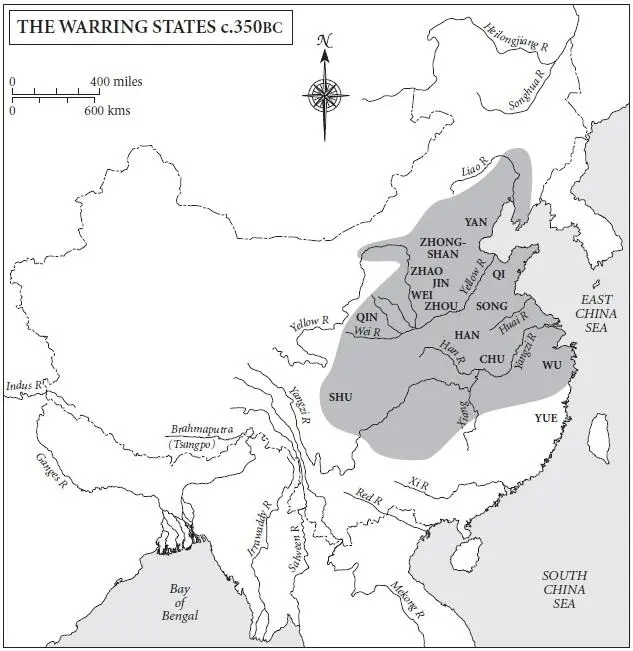
War followed, and since the rebellious brothers were governing territories in what had once been Shang’s central domains, the Zhou royal forces again swept east down the Yellow River, routing the enemy and not stopping this time until they reached the sea in Shandong province. An area of over 1,600 kilometres (1,000 miles) long by several hundred deep, in fact most of ‘the cradle’ that was north China, was now at Zhou disposal.
The victors parcelled it out among their kinsmen and commanders in the form of subordinate fiefs, many of which would become hereditary. From this division of the spoils were born the territorial units that would develop into states under the later Zhou and, later still, would provide the dynasties of imperial China with a handy checklist from which to select a dynastic name. They included, to the north of the Yellow River, Yan (near modern Beijing) and Jin, which would disintegrate into Han, Wei and Zhao; also Qi and Lu in Shandong (the first conferred on King Wen’s Chiang ally, the second on the Duke of Zhou’s son); and numerous lesser entities such as Tang and Song (where a contrite Shang leader was reinstated).
The history and geography of these states are not especially relevant at this point; but the way their names echo down through the centuries is notable. Most later dynasties would look back to the Zhou and to the states they had unwittingly created as a prime source of legitimisation. Besides appropriating their names – hence the later imperial dynasties of Jin, Wei, Tang, Song, etc. – great imperial houses might also claim descent from their ruling lineage or regional association with it. Either way, Zhou and its subordinate states came to embody an archaic authenticity out of all proportion to their achievements. Perceived as favoured exemplars, they conferred incontestable prestige and would be shamelessly exploited for it.
Just one exception may be noted. Established by the Zhou a century later on the steppe-land borders of Gansu province, the horse-breeding fief called Qin would seldom attract endorsement from posterity’s dynastic giants. Though becoming a state, a kingdom and then an empire, Qin as a name would be little commandeered by others and, until the twentieth century, no orthodox Chinese ruler would care to be associated with it. Throughout most of history the royal Zhou so outranked the imperial Qin in heavenly kudos that they were often considered polar opposities. The Zhou, despite – or possibly because of – their tolerance of a ‘feudal’ federalism, were reckoned virtuous; and the Qin, with their aggressive centralism, were not. Only when patriotic nationalists revived the memory of Qin’s first ever unification of China, and when Marxists and Maoists discovered the revolutionary credentials of its despotic instigator – not to mention terracotta evidence of his awesome power – would Qin cease to be a dirty word.
Читать дальше
